湘少版六年级下册Unit 2
湘少版小学各册全部英语单词(带音标)

小学各册全部英语单词湘少版三年级上册单词Unit 1Hello你好[heˈləu] I我[ai]nice愉快的[nais] meet遇见[mi:t]you 你[ju:]too也[tu:]Unit2who谁[hu:]good 好[ɡud] morning早上[ˈmɔ:niŋ]Miss小姐[mis] Afternoon下午[ɑ:ftəˈnu:n]Unit3what什么[wɔt]your你的[jɔ:r] name 名字[neim]my我的[mai]Unit4bag包[bæɡ]thank谢谢[θæŋk] welcome欢迎[ˈwelkəm]boy男孩[bɔi]girl 女孩[ɡə:l] doll洋娃娃[dɔl] man男人[dɔl] woman妇女[ˈwumən] Unit5he他[hi:]brother弟弟[ˈbrʌðə]father爸爸[ˈfɑ:ðə]she她[ʃi:]mother妈妈[ˈmʌðə]sister姐姐[ˈsistə]Unit6this这[ðis]family家庭[ˈfæmili]photo相片[ˈfəutəu]grandfather爷爷[ˈɡrændfɑ:ðə]grandmother奶奶[ˈɡrændˌmʌðə]uncle叔叔[ˈʌŋkl]aunt婶婶[ɑ:nt]cousin堂(表)兄弟姐妹[ˈkʌzn]Unit7soldier士兵;战士[ˈsəuldʒə]postman邮递员[ˈpəustmən]nurse护士[nə:s]teacher老师[ˈti:tʃə]doctor医生[ˈdɔktə]driver司机[ˈdraivə]Unit8fireman消防员[ˈfaiəmən]policeman男警察[pəˈli:smən]policewoman女警[pəˈli:swʊmən]pupil学生[ˈpju:pəl]Unit9sorry对不起[ˈsɔri]know知道[nəʊ]nose鼻子[nəuz]mouth嘴巴[mauθ]head头[hed]hair头发[hɛə]ear耳朵[iə]eye 眼睛[ai]tooth牙齿[tu:θ]Unit10touch触摸[tʌtʃ]raise举起[reiz]hand手[hænd]toe脚趾[təʊ]leg腿[leg]body身体[ˈbɔdi]neck脖子[nek]arm手臂[ɑ:m]foot脚[fut]Unit11cow母牛[kau]take拿[teik]card卡片[kɑ:d]pig猪[pig]duck鸭子[dʌk]hen母鸡[hen]mouse老鼠[maus]Unit12schoolbag书包[ˈsku:lbæg]in在…里面[in]ruler尺子[ˈru:lə]eraser橡皮擦[ɪˈreɪsə]glue胶水[ɡlu:]pencil-box文具盒[ˈpensəl] [bɔks]apple苹果[ˈæpl]不得用于商业用途book书[buk]pencil sharpener削笔刀[ˈʃɑːpnə(r)]Unit13lion狮子[ˈlaiən] bird鸟[bə:d] monkey猴子[ˈmʌŋki] all right好吧[ɔ:l rait]dog狗[dɔɡ]frog青蛙[frɔɡ]cat猫[kæt]Unit14computer电脑[kəmˈpju:tə]friend朋友[frend] screen屏幕[skri:n] can能;会[kæn]see看见[si:]thing东西[θiŋ]on在…上面[ɔn]me我(宾格)[mi:] need需要[ni:d] keyboard键盘[ˈki:bɔ:d]type打字[taip] word字;单词[wə:d] show显示[ʃəu]many许多[ˈmeni]不得用于商业用途仅供个人参考不得用于商业用途湘少版英语三年级下册单词Unit1 how 怎么样[hau] fine 美好的[fain] well 好的[wel] kind 友好的kaind] about 关于[əˈbaut] thanks 谢谢[θæŋks] Unit2 number 号码[ˈn ʌmb ə] car 小汽车[k ɑr] one 一[w ʌn] two 二[tu:] three 三[θri:] four 四[f ɔr] five 五[faiv] six 六[siks] seven 七[ˈsev ən] eight 八[e ɪt] nine 九[nain] ten 十[ten] zero 零[ˈzi ər əu] Unit3 old 老的;旧的[əuld] sick 生病的[sik] please 请[pli:z] birthday 生日[ˈb ə:θdei] Unit4 the 这[ðə] time 时间[taim] OK 好[əʊˈke ɪ] at 在…(时间/地点) [æt] clock 闹钟[kl ɔk] good-bye 再见[ˈg ʊd ˈba ɪ]eleven 十一[ɪˈlev ən] twelve 十二[twelv]o ’clock …点钟[əˈkl ɔk] night 晚上[nait] day 白天[dei]Unit5 pen 钢笔[pen] count 数[kaunt] thirteen 十三[θɜ:ˈti:n] fourteen 十四[f ɔː(r)ˈti ːn] fifteen 十五[f ɪf ˈti:n] sixteen 十六[s ɪk ˈsti:n] seventeen 十七[sev(ə)n ˈti ːn] eighteen 十八[e ɪˈti:n] nineteen 十九[na ɪn ˈti:n] twenty 二十[ˈtwenti] Unit6 color 颜色[ˈk ʌl ə] red 红色的[red] pink 粉红色的[pi ŋk] blue 蓝色的[blu:] yellow 黄色的[ˈjel əu] white 白色的[wait] green 绿色的[ɡri:n] cloud 云[klaud]Unit7food 食物[fu:d] drink 饮料、喝[dri ŋk]cup 杯子[k ʌp] chopsticks 筷子[ˈt ʃɔpst ɪks] bowl 碗[b əul] plate 盘子[pleit]Unit8 banana 香蕉[b əˈn ɑ:n ə]mango 芒果[ˈmæŋg əʊ] lemon 柠檬[ˈlem ən] market 市场[ˈm ɑ:kit] classroom 教室[ˈkl ɑ:sru:m]orange 桔子[ˈɔrind ʒ] pineapple 菠萝[ˈpain ˌæpl]Unit9like 喜欢[laik] sunny 晴朗的[ˈs ʌni] rain 雨[rein]ice-cream 冰淇淋['a ɪskri ːm]rainy 有雨的[ˈreini] warm 暖和的[w ɔ:m] hot 热的[h ɔt]Unit10cold 冷的[k əuld] weather 天气[ˈweðə] windy 有风的[ˈw ɪndi:] snowy 有雪的[ˈsn əʊi:] cloudy 有云的[ˈklaudi]仅供个人参考不得用于商业用途Unit11T-shirt T 恤衫[ˈti:ʃə:t]they 他们;它们[ðe i] beautiful 漂亮的[ˈbju:t əful] big 大的[b ɪɡ] trousers 裤子[ˈtrauz əz]shorts 短裤[ʃɔ:ts] coat 外套[k əut] dress 连衣裙[dres] shirt 衬衫[ʃə:t]Unit12 come to 来到[k ʌm][tu:]school 学校[sku:l] them 他们(宾格)[ðem]ship 轮船[ʃip]by 乘坐(交通工具)[bai]plane 飞机[plein] car 小汽车[k ɑr]him 他(宾格)[him] bus 公共汽车[b ʌs] bicycle 自行车[ˈbaisikl]train 火车[trein]Unit13shape 形状[ʃeip] circle 圆形[ˈs ə:kl] triangle 三角形[ˈtraiæŋɡl] robot 机器人[ˈr əub ɔt]Unit14jumper 套头毛衣[ˈd ʒʌmp ə] mummy 妈妈[ˈm ʌmi:] fit 适合[fit]put on 穿上[put][ɔn]仅供个人参考不得用于商业用途湘少版英语四年级上册单词Unit1 are 是[ɑ:] thanks 谢谢[θæŋks] brother 弟弟[ˈbr ʌðə] sister 姐姐[ˈsist ə] Unit2 flag 旗[flæɡ] sixteen 十六[s ɪk ˈsti:n] eleven 十一[ɪˈlev ən] teapot 茶壶[ˈti:ˌp ɔt] Unit3 elephant 大象[ˈelif ənt] big 大的[big] monkey 猴子[ˈm ʌŋki] naughty 调皮的[ˈn ɔ:ti] tiger 老虎[ˈtai ɡə] strong 强壮的[str ɒŋ] beautiful 漂亮的[ˈbju:t əful] small 小的[sm ɔ:l] Unit4 children 孩子(child 的复数) [ˈt ʃɪldr ən] outing 郊游[ˈa ʊt ɪŋ] these 这些[ði:z] ladybird 瓢虫[ˈle ɪdi ˌb ɜ:d] those 那些[ðəuz] seagull 海鸥[ˈsi:g ʌl] egg 蛋[eg]Unit5 hungry 饥饿的[ˈh ʌŋɡri] dumpling 饺子[ˈd ʌmpl ɪŋ] jam 果酱[d ʒæm] bread 面包(不可数) [bred] biscuit 饼干[ˈbiskit] noodle 面条[ˈnu:dl] rice 米饭(不可数)[rais] milk 牛奶[milk] Unit6 whose 谁的[hu:z] purse 钱包[p ə:s] scarf 围巾[sk ɑ:f] hat 帽子[hæt] Unit7 guess 猜[ɡes] left 左[left] right 右[rait] turn 转弯[t ə:n]traffic police 交通警察 [ˈtræfik p əˈli:s] policeman 男警察[p əˈli:sm ən] coin 硬币[k ɔin] Unit8painting 画[ˈpeinti ŋ] exit 出口[ˈeksit] photo album 相册 [ˈf əut əu ˈælb əm] belt 腰带[belt]Unit9flat 旗[flæt] number 号码[ˈn ʌmb ə] their 他们的[ðer] in front of 在[in fr ʌnt ɔv]door 门 [d ɔr] bedroom 卧室[ˈbedru:m] bed 床[bed]brown 褐色的;棕色的[braun] table 桌子[ˈteibl] chair 椅子[t ʃɛə] wardrobe 柜橱[ˈw ɔ:dr əub]Unit10where 哪里[w ɛə] under 在…下面[ˈʌnd ə] in 在…里面[in] bathroom 浴室[ˈb ɑ:θrum] kitchen 厨房[ˈkit ʃin] on 在…上面[ɔn]living room 客厅[ˈlivi ŋ ru:m]Unit11homework 家庭作业 sum 总和wrong 错误的[r ɔŋ] forty-six 四十六仅供个人参考不得用于商业用途[ˈf ɔ:ti:] [siks] forty-four 四十四[ˈf ɔ:ti:] [ˈf ɔ:] twenty 二十[ˈtwenti] thirty 三十[ˈθɜ:ti:] forty 四十[ˈf ɔ:ti:] fifty 五十[ˈf ɪfti] sixty 六十[ˈs ɪksti] seventy 七十[ˈs ɛv ənti] eighty 八十[ˈe ɪti] ninety 九十[ˈna ɪnti] one hundred 一百 [w ʌn][ˈh ʌndr əd]one hundred and forty-four 144Unit12swim 游泳[swim] fast 快地[f ɑ:st] jump 跳[d ʒʌmp]high 高的;高地[hai] run 跑步[r ʌn]throw 扔;投[θr əu] far 远的;远地[f ɑ:] fly 飞[flai]Unit13plate 盘子[pleit] orange 橙色的[ˈɔrind ʒ]grey 灰色的[grei] warm 暖和的[w ɔ:m]Unit14lake 湖[leik] sky 天空[skai] boat 小船[b əut] ship 轮船[ʃip] city 城市[ˈsiti]仅供个人参考不得用于商业用途湘少版英语四年级下册单词Unit1 a pair of 一双[ə p ɛə ɔv] shoe 鞋[ʃu:] cupboard 柜橱[ˈk ʌb əd] behind 在…后面[bi ˈhaind] new 新的[nju:] glasses 眼镜[ˈgl ɑ:s ɪz] Unit2 in English 用英语[in ˈɪŋgl ɪʃ] busy 忙碌的[ˈbizi] can 能;会[kæn] climb 爬[klaim] write 写[rait] letter 信[ˈlet ə] can ’t=can not 不能[kænt] Unit3 make 制作[meik] piano 钢琴[pi ˈæn əu] bake 烤;烘焙[beik] pie 甜馅饼[pai] mess 混乱[mes] boat 小船[b əut] Unit4 sleep 睡觉[sli:p] work 工作[w ə:k] sweep 打扫[swi:p] cook 做饭[kuk] paint 画[peint]Unit5hop 单足跳[h ɔp] dance 跳舞[d ɑ:ns] basketball 篮球[ˈb ɑːsk ɪtb ɔːl] skip 跳绳[skip] Unit6 walk 走;步行[w ɔ:k] empty 空的[ˈempti] go 去[ɡəu] come 来[k ʌm]holiday 假日;假期[ˈh ɔl ədi] post office 邮局[p əust ˈɔfis]Unit7 Sunday 星期天[ˈs ʌndei] Monday 星期一[ˈm ʌndei] Tuesday 星期二[ˈtju:zdei] Wednesday 星期三[ˈwenzdei] Thursday 星期四[ˈθə:zdei] Friday 星期五[ˈfraidei] Saturday 星期六[ˈsæt ədei] music 音乐[ˈmju:zik] lesson 功课[ˈles ən] football 足球[ˈfutb ɔ:l]Unit8cool 凉快的[ku:l] spring 春天[spri ŋ] summer 夏天[ˈs ʌm ə] autumn 秋天[ˈɔ:t əm] winter 冬天[ˈwint ə]Unit9from 从;来自[fr ɔm] international 国际的[ˌɪnt əˈnæʃən əl] camp 营地[kæmp] China 中国[ˈt ʃa ɪn ə] Canada 加拿大[ˈkæn əd ə] India 印度[ˈɪnd ɪə] France 法国[fræns] America 美国[əˈmer ɪk ə]Australia 澳大利亚[ɔ:ˈstre ɪlj ə]Unit10how much 多少[hau m ʌt ʃ]dollar 美元[ˈd ɔl ə] pound 英镑[paund] yuan 元lollipop 棒棒糖[ˈl ɔli:ˌp ɔp]Unit11leg 腿[leg]仅供个人参考不得用于商业用途foot 脚[fut] feet 脚(复数) finger 手指[ˈfi ŋɡə] knee 膝盖[ni:] puppet 木偶[ˈp ʌpit] hold 握住;拿[h əuld]Unit12 ticket 票[ˈtikit] hurry 匆忙的[ˈh ʌri] shirt pocket 衬衫口袋[ˈp ɔkit] sock 短袜[s ɔk]Unit13give 给[giv]Unit14 any 一些[ˈeni] money 钱[ˈm ʌni]仅供个人参考不得用于商业用途湘少版英语五年级上册单词Unit1cold drink 冷饮[k əuld dri ŋk] market 市场[ˈm ɑ:kit] hungry 饥饿的[ˈh ʌŋɡri]bun 包子[b ʌn]feel 感觉[fi:l] have 有;吃[hæv]Unit2home 家[h əum] please 请[pli:z] soup 汤[su:p] vegetable 蔬菜[ˈved ʒit əbl] water 水[ˈw ɔ:t ə] breakfast 早餐[ˈbrekf əst] lunch 午饭[l ʌnt ʃ] supper 晚餐[ˈs ʌp ə] salt 盐[s ɔ:lt]Unit3me 我(宾格)[mi:] borrow 借进[ˈb ɒr əʊ] English 英语[ˈɪŋgl ɪʃ] forget 忘记[f əˈɡet] remember 记得;想起[ri ˈmemb ə] tomorrow 明天[t əˈm ɔr əu] blackboard 黑板[ˈblækb ɔ:d] brush 刷子[br ʌʃ] Unit4puppy 小狗[ˈp ʌpi] pet 宠物[pet] shop 商店[ʃɔp]rabbit 兔子[ˈræbit] cage 笼子[keid ʒ] lovely 可爱的[ˈl ʌvli] hold 拿;握;抱[h əuld]Unit5 raincoat 雨衣[ˈreink əut]long 长的[l ɔŋ]short 短的[ʃɔ:t]thick 厚的[θik] thin 薄的;瘦的[θin] that 那[ðæt] cheap 便宜的Unit6sweet 糖果;甜的[swi:t]a box of 一盒[b ɔks] hard 硬的[h ɑrd] soft 软的[s ɔft]teeth 牙齿(tooth 的复数)[ti:θ] jelly 果冻[ˈd ʒeli:] nut 坚果[n ʌt]lollipop 棒棒糖[ˈl ɔli:ˌp ɔp]chocolate 巧克力[ˈt ʃɔk əlit]ice-cream 冰淇淋['a ɪskri ːm]Unit7hobby 业余爱好[ˈh ɔbi] collect 收集[k əˈlekt]sticker 贴画[ˈst ɪk ə] roller-blading 滑旱冰 [ˈr əul ə] [bleidi ŋ] sticker album 贴画簿 [ˈst ɪk ə] [ˈælb əm] story 故事[ˈst ɔ:ri]Unit8get up 起床[ɡet ʌp] go to bed 上床睡觉[ɡəu tu: bed]timetable 时间表[ˈta ɪm ˌte ɪb əl] Chinese 汉语[t ʃa ɪˈni:z]math 数学[mæθ] music 音乐[ˈmju:zik] half past one 一点半 class 课堂[kl ɑ:s]Unit9make the bed 整理床铺[meik] iron 熨烫[ˈai ən]clothes 衣服[kl əuðz] him 他(he 的宾格)[h ɪm]meal 一餐[mi:l] plant 植物[pl ɑ:nt]Unit10sign 标志[sain] mean 意味着[mi:n] cinema 电影院仅供个人参考不得用于商业用途[ˈsin əm ə]Guests do not go in 闲人免进[ɡest s] No mobile phone[ˈm əubail f əun] 请勿使用手机No talking 请勿讲话[ˈt ɔ:k ɪŋ]No fishing 请勿钓鱼[ˈf ɪʃɪŋ] No picking of flowers 请勿摘花 [n əʊ] [ˈpiki ŋ] [ˈflau əz]No spitting 请勿随地吐痰 [n əʊ] [ˈspiti ŋ] No parking 请勿停车[ˈp ɑ:k ɪŋ]turn 转弯[t ə:n]Unit11teacher 老师[ˈti:t ʃə] happy 高兴的[ˈhæpi] angry 生气的[ˈæŋɡri] sad 伤心的[sæd] shy 害羞的[ʃai]tired 累的;疲劳的[ˈtai əd]snap one ’s fingers 弹某人的手指[snæp] [w ʌnz] [ˈfi ŋɡə] clap 拍手[klæp] wink 眨眼[wi ŋk]fold 合拢;折叠[f əuld]Unit12Spring Festival 春节 [spri ŋ] [ ˈfest əv əl] relative 亲戚[ˈrel ətiv]eve of the Spring Fstival 除夕[i ːv] reunion 团圆[ˌri:ˈju:ni ən]red packet 红包[red ˈpækit] burn 燃放;点燃[b ə:n] firecracker 鞭炮[ˈfa ɪəˌkræk ə]lion dance 舞狮[ˈlai ən d ɑ:ns] dragon dance 舞龙 [ˈdræɡən d ɑ:ns]Unit13comb 梳头[k əum] kind 友好的[kaind] sharpen 削尖;磨快[ˈʃɑ:p ən]Unit14 Hunan Provincial Museum [pr əˈv ɪn ʃəl] [mju:ˈzi əm] 湖南省博物馆Yueyang Tower 岳阳楼[ˈtau ə]Taoyuadong National Forest Park 桃源洞国家森林公园 [ˈnæʃən əl] [ˈf ɔrist] Window of the World 世界之窗 [ˈwind əu] [w ɜː(r)ld仅供个人参考不得用于商业用途湘少版英语五年级下册单词Unit1roof 房顶[ru:f] chimney 烟囱[ˈt ʃimni] above 在…的上方[əˈb ʌv]Unit2wait 等待[weit] rubbish bin 垃圾桶[ˈr ʌbi ʃ bin] dirty 脏的[ˈd ə:ti] be careful 小心[bi: ˈk ɛəful]café咖啡店[kæˈfe ɪ] spill 使…溅出;溢出[spil] sugar 糖[ˈʃu ɡə] seat 座位[si:t]a cup of 一杯[ə k ʌp ɔv]tea 茶[ti:]Unit3 anyone 任何人[ˈeniw ʌn] road 道路;马路[r əʊd] corner 角落;拐角处[ˈk ɔ:n ə]post office 邮局[p əust ˈɔfis]outside 在…的外面(反inside ) [ˌaut ˈsaid] [in ˈsaid]shopping centre 购物中心 [ˈʃɔp ɪŋ ˈsent ə]street 街;街道[stri:t]near 在…附近[ni ə]Unit4 yesterday 昨天[ˈjest ədei] today 今天[t əˈdei] sick 生病的[sik] weekday 平日[ˈwi:kdei] weekend 周末[ˌwi:k ˈend]railway station 火车站 [ˈreilwei ˈstei ʃən] hand in 交上[hænd in] then 那么;当时[ðen] finish 完成;结束[ˈfini ʃ]Unit5metre=meter 米;公尺[ˈmi:t ə]race 赛跑[reis] sports 运动会[sp ɔ:ts]first 第一 [f ə:st] second 第二[ˈsek ənd] third 第三[θɜ:d] fourth 第四 fifth 第五 sixth 第六[ s ɪksθ] seventh 第七[ˈsev ənθ] eighth 第八[e ɪtθ] ninth 第九[na ɪnθ] tenth 第十[tenθ] last 最后[l ɑ:st]Unit6 help 帮助[help] ring 戒指[ri ŋ]look for 寻找[luk f ɔ:]beside 在…旁边[bi ˈsaid]lamp 台灯[læmp] sofa 沙发[ˈs əuf ə] on top of 在…的顶部[ɔn t ɔp ɔv]Unit7 year 年[j ɪr]Children ’s Day 儿童节 [ˈt ʃɪldr ənz][dei] month 月份[m ʌnθ] January 一月[ˈd ʒænju əri] February 二月[ˈfebru əri]March 三月[m ɑ:t ʃ] April 四月[ˈeipr əl] May 五月[mei] June 六月[d ʒu:n] July 七月[d ʒu:ˈlai] August 八月[ɔ:ˈɡʌst] September 九月[s əp ˈtemb ə] October 十月[ɔk ˈt əub ə]November 十一月[n əu ˈvemb ə]December 十二月[di ˈsemb ə]Unit8mine 我的[main] ours 我们的[ˈau əz] yours 你们的[j ɔ:z]仅供个人参考不得用于商业用途his 他的[hiz] hers 她的[h ə:z]theirs 他(它)们的[ðɛəz]its 它的[its]both 两者;双方[b əuθ]Unit9hit 打;击中[hit] matter 事情[ˈmæt ə] naughty 顽皮的[ˈn ɔ:ti]each other 互相;彼此 [i:t ʃ ˈʌðə(r] sorry 对不起[ˈs ɔri]Unit10enjoy 享受…的乐趣[in ˈd ʒɔi]where 哪里[w ɛə] outing 出游[ˈa ʊt ɪŋ] Underwater World 海底世界 [ˈʌnd əˌw ɔ:t ə] [w ɜː(r)ld]Yuelu Academy 岳麓书院[əˈkæd əmi]Yuelu Mountain 岳麓山[ˈmauntin] Zoo 动物园[zu:] top 顶部[t ɔp]Unit11strange 陌生的;奇怪的[streind ʒ]television 电视[ˈteli ˌvi ʒən]ask 问;询问[ɑ:sk ] storeroom 仓库[ˈst ɔ:ˌru:m] steal 偷[sti:l]Unit12camp 营地[kæmp] taxi 出租汽车[ˈtæksi]on foot 步行[ɔn fut] by subway 乘地铁[ˈs ʌbwei]Unit13National Day 国庆节 [ˈnæʃən əl][dei] search 搜索[s ə:t ʃ]Unit14 bamboo 竹子[bæm ˈbu:]pen knife 小折刀[pen naif] scissors 剪刀[ˈsiz əz]paste 粘贴[peist] pull 拉(反义push 推)[pul]string 细绳;线[stri ŋ]broke 拉断;打破(break 过去式)[br əʊk] [breik]仅供个人参考不得用于商业用途湘少版英语六年级上册单词Unit1 swing 秋千[swi ŋ] bench 长椅[bent ʃ] stone 石头[st əun] angry 生气的[ˈæŋɡri] bark 叫;咆哮[b ɑ:k] chain 链子[t ʃein] slide 坡面[slaid] bite 咬[bait] cry 哭[krai] Unit2 always 总是;一直[ˈɔ:lweiz] family 家庭[ˈfæmili] usually 通常[ˈju ːʒu əli] often 经常[ˈɔf ən] late 晚的;迟的[leit] never 从不[ˈnev ə] wave 挥动[weiv] them 他们(宾格)[ðem] wake up 醒来[weik ʌp] Unit3 picnic 野餐[ˈpiknik] library 图书馆[ˈlaibr əri] science 科学[ˈsai əns] Unit4 magic 神奇的[ˈmæd ʒik] medicine 药[ˈmedisin]miss 想念;错过[mis] lonely 孤独地[ˈl əunli] mooncake 月饼[mu:n][keik]egg yolk 蛋黄[e ɡ j əuk] grape 葡萄[greip] tea 茶[ti:] Unit5 room 房间[ru:m] phone 电话[f əun] clearly 清楚地;清晰地[ˈkl ɪəl ɪ] noisily 吵闹地[ˈn ɔɪz ɪli] quietly 安静地[ˈkwa ɪətl ɪ] Unit6weak 虚弱的[wi:k] worried 但新的[ˈw ʌr ɪd] doctor 医生[ˈd ɔkt ə] little 小的[ˈlitl] tall 高的[t ɔ:l] age 年龄[eid ʒ] heavy 重的[ˈhevi] light 轻的;灯[lait] Unit7 bull 公牛[bul] field 田地[fi:ld] horn 角[h ɔ:n] idea 注意;想法[ai ˈdi ə]ugly 丑陋的[ˈʌɡli]rub 摩擦[r ʌb]foolish 愚蠢的[ˈfu:li ʃ]kill 杀死[kil]Unit8louder 更大声的(地) [laud]garden 花园[ˈɡɑ:dn] smaller 更小的[sm ɔ:l]bigger 更大的[b ɪɡ] hole 洞[h əul]pleased 高兴的[pli:zd]Unit9monkey 猴子[ˈm ʌŋki] pick up 摘[pik ʌp] shout 大声喊[ʃaut] towards 朝;向[t ə'w ɔ:dz]put down 放下[put daun]scold 责骂[sk əuld]Unit10visit 参观;拜访[ˈvizit]stair 阶梯[st ɛə] film 电影[film] excited 兴奋的[ɪk ˈsa ɪt ɪd]huge 巨大的[hju:d ʒ]Unit11meet遇见[mi:t] swimming suit游泳衣[ˈswɪmɪŋ sju:t] dangerous危险的[ˈdeindʒərəs]sand沙子[sænd]Unit12Christmas圣诞节[ˈkrisməs]present礼物[ˈprezənt]open打开[ˈəupən] Santa Claus圣诞老人[ˈsæntəˌklɔ:z]=Father Christmas stocking长筒袜[ˈstɔkiŋ]card卡片[kɑ:d]bike自行车[baik]computer电脑[kəmˈpju:tə]robot机器人[ˈrəubɔt]Unit13carry携带;搬运;[ˈkæri]difficult困难的[ˈdifikəlt]understand理解[ˌʌndəˈstænd]clever聪明的[ˈklevə]Unit14fairy tale童话故事[ˈfɛəri teil]pick摘[pik]wolf狼[wulf]hide躲藏[haid]arrive到达[əˈraiv]reply回答[riˈplai]hunter猎人[ˈhʌntə]湘少版英语六年级下册单词Unit1kid小孩;年轻人[kid]good at擅长于[ɡud æt]good idea好主意[aiˈdiə] picture图画[ˈpiktʃə]watch a film 看电影[wɔtʃ] Unit2learn学习[lə:n]skating rink溜冰场[ˈskeɪtɪŋrɪŋk]keep保持[ki:p]straight直的[streit]fall over跌倒[fɔ:l ˈəuvə]Unit3cover封面;覆盖[ˈkʌvə]不得用于商业用途enough足够的[iˈnʌf]sell买[sel]bookstore书店[ˈbʊkˌstɔ:] dictionary字典[ˈdikʃənəri] dirty mark污点[ˈdə:ti] [mark] useful有用的[ˈju:sful]of course当然[ɔv kɔː(r)s]Unit4earth地球[ə:θ]light灯[lait]Space Museum太空博物馆[spies] [mju:ˈziəm]land陆地[lænd]talk谈论[tɔ:k]interested感兴趣的[ˈɪntrɪstɪd] Unit5similar相似的[ˈsimilə]same相同的[seim]hawker小商贩[ˈhɔ:kə]more更多的[mɔ:]fewer较少的(few的比较级,加可数)[ˈfju:ə]different不同的[ˈdifərənt] less较少的;较小的(little的比较级,加不可数)[les]Unit6across穿过[əˈkrɔs]near在…的附近[niə] interesting有趣的[ˈintristiŋ] butcher肉贩;屠夫[ˈbutʃə]a piece of一块;一片[əpi:s ɔv] bridge桥[bridʒ]another另一个[əˈnʌðər]better更好的(good/well的比较级)[ˈbetə] other其他的[ˈʌðə(r]drop掉下;落下[drɔp]Unit7most最多的[məust]least最少的[li:st]boring无趣的[ˈbɔ:riŋ]librarian图书管理员[laiˈbrɛəriən]space太空[speis]Unit8Dragon Boat Race龙舟赛[ˈdræɡən][beit][reis]rice dumpling粽子[rais] [ˈdʌmplɪŋ]famous著名的[ˈfeiməs]poet诗人[ˈpəuit]lunar month阴历月份[ˈlju:nəmʌnθ]Unit9notice注意;通知[ˈnəutis]bus fare公共汽车费[bʌs] [fɛə] never mind别介意[ˈnevə maind] catch赶上;抓住(catch a bus)[kætʃ]Unit10will将会(加动词原形)[wil] won’t将不会[wəʊnt]weather forecast天气预报[ˈweðəˈfɔ:-kɑ:st]stay停留(stay at home呆在家)[stei]hate讨厌;恨[heit]不得用于商业用途不得用于商业用途仅供个人参考仅供个人用于学习、研究;不得用于商业用途。
六年级下册英语教案:unit2Somestoriesaremoreinteresting湘少版

六年级下册英语教案:Unit 2 Some stories are moreinteresting教学内容本单元围绕“故事”这一主题,通过不同的故事内容,让学生学会表达对故事的看法和感受。
主要内容包括:词汇学习(如“interesting”, “boring”, “funny”等形容词),句型练习(如“I think the story is interesting.”),以及听力、阅读、口语和写作技能的培养。
教学目标1. 知识目标:学生能够掌握并运用本单元的关键词汇和句型。
2. 能力目标:培养学生听、说、读、写的能力,特别是能够就故事内容进行简单讨论和表达个人观点。
3. 情感目标:激发学生对英语学习的兴趣,培养合作学习的意识。
教学难点1. 正确使用形容词描述故事的特点。
2. 流利地运用句型表达对故事的看法。
3. 提高听力理解能力,特别是理解不同故事的主旨。
教具学具准备1. 教材和相关练习册。
2. 录音机或电脑播放设备。
3. 故事卡片或图片。
4. 黑板和粉笔。
教学过程1. 课堂导入:通过播放一段有趣的英语故事,吸引学生的注意力,并引入本课主题。
2. 新知呈现:展示并解释新词汇,通过示例句型进行教学。
3. 听力练习:播放录音,让学生听不同故事,并回答相关问题。
4. 口语练习:分组讨论,让学生用所学词汇和句型表达对故事的看法。
5. 写作练习:布置写作任务,让学生写一篇简短的故事评论。
板书设计中心:单元“Some stories are more interesting”左侧:列出关键词汇和句型右侧:简要记录听力练习和口语练习的要点作业设计1. 完成练习册上的相关练习。
2. 写一篇关于自己喜欢的故事的简短评论。
3. 预习下一课的内容。
课后反思课后反思将关注学生的参与度、新知识的掌握程度以及教学目标的达成情况。
教师需要评估教学方法和材料的有效性,并根据学生的反馈调整教学策略,以提高教学效果。
此教案旨在通过多元化的教学方法,帮助学生有效掌握英语知识,同时培养他们对英语学习的兴趣和合作学习的意识。
2014湘少版六年级Unit2_最新版_Katie_always_gets_up_early (恢复)

Yesterday, he saw a few beautiful birds. They sang very well. He could not name them. Now he is waiting for them to come again. He is going to observe them and take photos of them.
Katie gets up early _____________. On weekdays she ____________, always gets up at 6:30 a.m. ____________.
always _______
family Her _________often has breakfast _______________at
2.Katie always get up early ----Miss cao
get up early
早起
always often sometimes
never
总是 常常;时常
有时 从不
never
everyday
always often
someay
在……之后
What does John do? What does John study? What did he see yesterday? What is he going to do today?
an old scientists 1, He is____________________. 2, He birds studies__________________. 3, a few beautiful birds He________________________. He is going to observe them 4, and take photos of them __________________________.
湘少版英语六年级下册Unit_2练习题
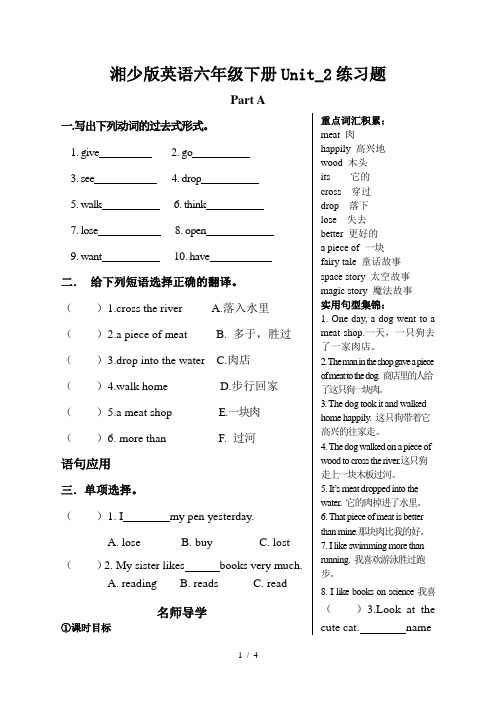
湘少版英语六年级下册Unit_2练习题Part A一.写出下列动词的过去式形式。
1. give2. go3. see4. drop5. walk6. think7. lose 8. open9. want 10. have二.给下列短语选择正确的翻译。
()1.cross the river A.落入水里()2.a piece of meat B. 多于,胜过()3.drop into the water C.肉店()4.walk home D.步行回家()5.a meat shop E.一块肉()6. more than F. 过河语句应用三.单项选择。
()1. I my pen yesterday.A. loseB. buyC. lost ()2. My sister likes books very much.A. readingB. readsC. read名师导学①课时目标重点词汇积累:meat 肉happily 高兴地wood 木头its 它的cross 穿过drop 落下lose 失去better 更好的a piece of 一块fairy tale 童话故事space story 太空故事magic story 魔法故事实用句型集锦:1. One day, a dog went to a meat shop.一天,一只狗去了一家肉店。
2. The man in the shop gave a piece of meat to the dog. 商店里的人给了这只狗一块肉。
3. The dog took it and walked home happily. 这只狗带着它高兴的往家走。
4. The dog walked on a piece of wood to cross the river.这只狗走上一块木板过河。
5. It’s meat dropped into the water. 它的肉掉进了水里。
湘少版英语六年级下册Unit2 Some stories are more interesting

Unit 2 Some stories are more interesting教学目标:1、学习本课新单词a piece of, meat ,cross, eat, happily, its, wood, drop, lose.2、能掌握并用句型“A is /are more …than B”,对两事物进行比较。
3、能听懂、理解本课故事。
4 、会用like doing more than doing5通过本课的语言故事,使学生明白做人不要过于贪心的道理。
教学重点:掌握并运用句型“A is /are more …than B”,;理解、阅读本课故事。
教学难点:复述本课故事教学准备:Word cards, Type, Drawing Instrument教学过程:Step 1 warm-up1、师生互相问候。
2、sing a song :The More We get togetherStep 2 Presentation and drill1 Talk about the pupils in the classroom. Point to a boy and say He is tall. Point to another boy andsay : He is taller.板书taller A is taller than B 然后学生指名谈论教室里的人或物。
Look at this picture, do you know who he is?S: Is he your brother / classmate /……?T: Yes, He is my friend .Now he is 32 years old.He was 11 when he took this picture .We lived in a small village near a river .There was a bridge across the river. This is a wood bridge.T: We went to school together happily every day. We walked to school on foot. My math was better than his, but his Chinese was better than mine .I like reading stories .Some stories are more interesting 教师边说边板书课题:Unit 2 Some stories are more interesting学生齐读课题后,教师引导学生理解课题的含义。
六年级英语下册素材-Unit2 课文翻译 湘少版(三起)
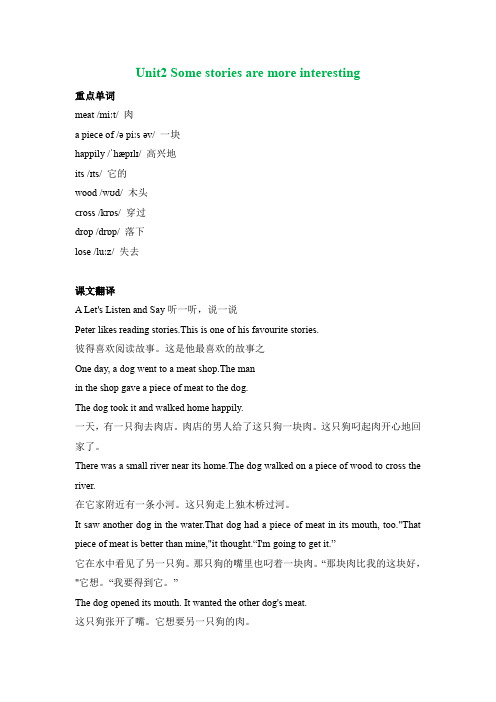
Unit2 Some stories are more interesting重点单词meat /miːt/ 肉a piece of /ə piːs əv/ 一块happily /ˈhæpɪlɪ/ 高兴地its /ɪts/ 它的wood /wʊd/ 木头cross /krɒs/ 穿过drop /drɒp/ 落下lose /luːz/ 失去课文翻译A Let's Listen and Say听一听,说一说Peter likes reading stories.This is one of his favourite stories.彼得喜欢阅读故事。
这是他最喜欢的故事之One day, a dog went to a meat shop.The manin the shop gave a piece of meat to the dog.The dog took it and walked home happily.一天,有一只狗去肉店。
肉店的男人给了这只狗一块肉。
这只狗叼起肉开心地回家了。
There was a small river near its home.The dog walked on a piece of wood to cross the river.在它家附近有一条小河。
这只狗走上独木桥过河。
It saw another dog in the water.That dog had a piece of meat in its mouth, too."That piece of meat is better than mine,"it thought.“I'm going to get it.”它在水中看见了另一只狗。
那只狗的嘴里也叼着一块肉。
“那块肉比我的这块好,"它想。
“我要得到它。
”The dog opened its mouth. It wanted the other dog's meat.这只狗张开了嘴。
湘少版小学英语教材目录
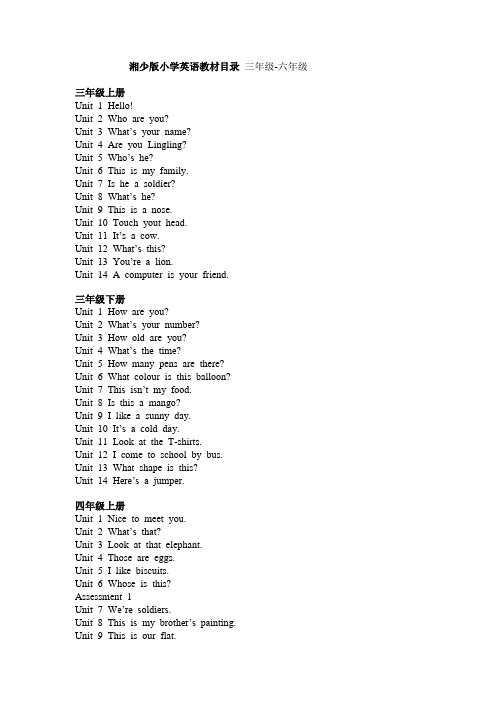
湘少版小学英语教材目录三年级-六年级三年级上册Unit 1 Hello!Unit 2 Who are you?Unit 3 What’s your name?Unit 4 Are you Lingling?Unit 5 Who’s he?Unit 6 This is my family.Unit 7 Is he a soldier?Unit 8 What’s he?Unit 9 This is a nose.Unit 10 Touch yout head.Unit 11 It’s a cow.Unit 12 What’s this?Unit 13 You’re a lion.Unit 14 A computer is your friend.三年级下册Unit 1 How are you?Unit 2 What’s your number?Unit 3 How old are you?Unit 4 What’s the time?Unit 5 How many pens are there?Unit 6 What colour is this balloon?Unit 7 This isn’t my food.Unit 8 Is this a mango?Unit 9 I like a sunny day.Unit 10 It’s a cold day.Unit 11 Look at the T-shirts.Unit 12 I come to school by bus.Unit 13 What shape is this?Unit 14 Here’s a jumper.四年级上册Unit 1 Nice to meet you.Unit 2 What’s that?Unit 3 Look at that elephant.Unit 4 Those are eggs.Unit 5 I like biscuits.Unit 6 Whose is this?Assessment 1Unit 7 We’re soldiers.Unit 8 This is my brother’s painting.Unit 9 This is our flat.Unit 10 Where’s the cat?Unit 11 Your homework is good.Unit 12 I can swim fast. Assessment ⅡUnit 13 Your plate is orange and grey. Unit 14 What can you see?四年级下册Unit 1 Where’s my new cap?Unit 2 Can you write in English?Unit 3 Are you making a kite?Unit 4 Peter is writing.Unit 5 What’s Anne doing?Unit 6 Where are you going?Unit 7 Peter is happy today.Unit 8 Spring is warm and nice.Unit 9 I come from China.Unit 10 How much is the apple?Unit 11 I have a puppet.Unit 12 Do you have a ticket?Unit 13 I like my toy soldier.Unit 14 Do you have any money? Assessment 1Assessment 2五年级上册Unit 1 I’d like a cold drinkUnit 2 Do you want some rice?Unit 3 Can I borrow a pencil?Unit 4 Can I have a puppy?Unit 5 Which one do you want?Unit 6 I like sweets.Assessment ⅠUnit 7 Do you have any hobbies?Unit 8 What time do you get up?Unit 9 My father helps me.Unit 10 What does that sign mean? Unit 11 We are sorry.Unit 12 The Spring Festival Assessment ⅡUnit 13 I brush my teeth every day. Unit 14 What’s the name of this place?五年级下册Unit 1 Draw a cat on the roof.Unit 2 Don’t put your feet on t he seat.Unit 3 There’s a policeman near the post office. Unit 4 Where were you, Mingming?Unit 5 Who was first?Unit 6 Was it in the wardrobe?Assessment IUnit 7 When’s your birthday?Unit 8 That’s not mine!Unit 9 Benny took my ball.Unit 10 Where did you go?Unit 11 What time did you see him?Unit 12 I came by plane.Assessment Unit 13 When is your country’s National Day? Unit 14 Peter made a kite with paper and bamboo.六年级上册Unit1 The children are playing in the park.Unit2 Katie always gets up early.Unit3 Let’s go to the Underwater World.Unit4 It’s the Mid-Autumn Festival..Unit5 The children are playing noisily..Unit6 How tall are you?Unit7 These horns are too big.Unit8 My singing is louder than yours.Unit9 What is Dongdong going to do?Unit10 Are you going to visit Anne?Unit11 When are we going to swim?Unit12 ChristmasUnit13 I’m as happy as a bird.Unit14 A Fairy Tale六年级下册Unit1 You’re good at drawing, Peter.Unit2 Anne wanted to skate.Unit3 Have you got enough money?Unit4 Our earth looks like this from space.Unit5 There are more shops in Picture One.Unit6 Some stories are more interesting than other Unit7 The most Interesting StoriesUnit8 The Dragon Boat FestivalUnit9 What can I do?Unit10 Tomorrow will be rainy。
湘少版六年级下册英语Unit 1-2教案与反思

Unit1Afamilyouting 祸兮福之所倚,福兮祸之所伏。
《老子·五十八章》原创不容易,【关注】店铺,不迷路!Period1一、教学目标(Teacs)1.知识目标(KnowledgeAims):1)能看懂、会读、会说新单词togets):1)能向他人询问、回答出行计划;2)能理解课本A与B部分。
3.情感目标(EmotionAims):学会小组合作,团结友爱。
二、教学重难点(Teac ingup1.Greetings.2.Freetalk.Talkabouttovie?Goses.Ido,yousay.Tilygoingtodo? Listenandrepeat.Listenandact.Steptework1.ListenandreadPartAandB.2.Copytes.五、板书设计(BlackboardDesign)Unit1Afamilyoutingtoget s)1.知识目标(KnowledgeAims):1)能看懂、会读、会说新单词togets):1)能向他人询问、回答出行计划;2)能理解课本D部分的阅读内容。
3.情感目标(EmotionAims):学会小组合作,团结友爱。
二、教学重难点(Teac ingup1.Greetings.2.Freetalk.Talkaboutwilyoutside.板书设计Unit1AfamilyoutingMyfamilygoesto...教学反思Period3一、教学目标(Teacs)1.知识目标(KnowledgeAims):1)能看懂、会读、会说新单词togets):1)能向他人询问、回答出行计划;2)能运用所学句型、单词进行简单的写作。
3.情感目标(EmotionAims)学会小组合作,团结友爱。
二、教学重难点(Teac ingup1.Greetings.2.Freetalk:Telluswilyusuallydoesate.Wilygoouting?Steptwo:Presentation1.Wilyusuallydoatweekends?Saysometilyusuallygoatweekends?Tilymost EatingfoodTakingaalkWriteitdown.Steptilyouting?2.Actionsepartnerstosily.Studentscanvotefortostinterestingone.Stepfour:ework1.Trytowritedownyourfamilyouting.2.FinisilyoutingWilyusuallydoonweekends?Wilyusuallygoonweekends?Wily?教学反思Unit2SomestoriesaremoreintrestingPeriod1一、教案目标1.学习本课新单词apieceof,meat,cross,eat,ore...toretore...tent学生齐读课题后,教师引导学生理解课题的含义。
2018新版湘少版六年级英语下册全册教案
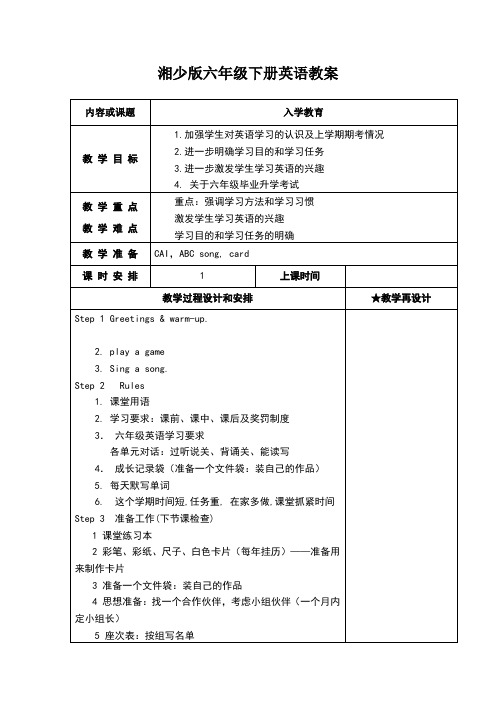
湘少版六年级下册英语教案
六年级下期英语教案
六年级下期英语教案
六年级下期英语教案
六年级下期英语教案
六年级下期英语教案
六年级下期英语教案
六年级下期英语教案
六年级下期英语教案
六年级下期英语教案
六年级下期英语教案
六年级下期英语教案
六年级下期英语教案
六年级下期英语教案
六年级下期英语教案
六年级下期英语教案
六年级下期英语教案
六年级下期英语教案
六年级下期英语教案
六年级下期英语教案
六年级下期英语教案
六年级下期英语教案。
新版湘少版六年级下册Unit2课时练习题

新版湘少版六年级下册Unit2课时练习题Part A一.写出下列动词的过去式形式。
1. give2. go3. see4. drop5. walk6. think7. lose 8. open9. want 10. have二.给下列短语选择正确的翻译。
()1.cross the river A.落入水里()2.a piece of meat B. 多于,胜过()3.drop into the water C.肉店()4.walk home D.步行回家()5.a meat shop E.一块肉()6. more than F. 过河语句应用三.单项选择。
()1. I my pen yesterday.A. loseB. buyC. lost ()2. My sister likes books very much.A. readingB. readsC. read名师导学①课时目标重点词汇积累:meat 肉happily 高兴地wood 木头its 它的cross 穿过drop 落下lose 失去better 更好的a piece of 一块fairy tale 童话故事space story 太空故事magic story 魔法故事实用句型集锦:1. One day, a dog went to a meat shop.一天,一只狗去了一家肉店。
2. The man in the shop gave a piece of meat to the dog. 商店里的人给了这只狗一块肉。
3. The dog took it and walked home happily. 这只狗带着它高兴的往家走。
4. The dog walked on a piece of wood to cross the river.这只狗走上一块木板过河。
5. It’s meat dropped into the water. 它的肉掉进了水里。
2014湘少版六年级Unit2 最新版 Katie always gets up early

Peter’s activies
Peter
always often sometimes never gets up at 7:00 a.m. goes to school by bus. does his homework before dinner
watches TV at 7:00 p.m.
has breakfast at 6:45 a.m.
After breakfast, she waves goodbye to her mother and goes to school.
return home
Katie returns home at 5:00 p.m. She often does her homework before dinner.She plays chess with her father after dinner.
is late for school goes to school at 10:00 p.m.
What does John do? What does John study? What did he see yesterday? What is he going to do today?
an old scientists 1, He is____________________. 2, He birds studies__________________. 3, a few beautiful birds He________________________. He is going to observe them 4, and take photos of them __________________________.
湘少版六年级下册英语复习资料汇总

湘少版六年级下册英语复习资料汇总Unit 1 You’re good at drawing, Peter.1. be good at..... 擅长于....(1) 后接动名词I am good at swimming.(2) 后接名词I am good at English.What are you good at? I am good at....What are you not good at? I am not good at....What is your best friend good at? / What is Anne / Peter good at?She / He is good at.......What do you like doing? 你喜欢做什么?I like watching films.2. Do you......? 如:Do you like fishing? Yes, I do. /No, I don’t.Unit 2 Anne wanted to skate.( 1 ) want to ....... 想要....(后接动词原形)What do you want to do? 你想要干什么?I want to fly a kite.第三人称What does Peter/she want to do?Peter/She wants to read a book.过去时态What did he want to do?He wanted to play computer games.( 2 ) try to ....... 努力、尝试做.... (后接动词原形) Lingling try to skate.Unit 3 Have you got enough money?(1)Have you got ........? 你有.........?Have you got enough money? 你有足够的钱吗?Yes, I have. / No, I haven’t.(2)一般疑问句(过去时态)Was the dictionary small enough? 这字典够小吗?Yes, it was./ No, it was not.(3)enough 和too 的用法enough 用来修饰形容词,放在形容词后面。
2014湘少版六年级Unit2_最新版_Katie_always_gets_up_early

F Let’s Have Fun
• The snail says,“I feel nice.蜗牛说:“我感 觉很好 • I love my shell. 我爱我的壳。 • When I see mice, 当我看见老鼠, • I go into my shell. 我钻进我的壳里。 • I always carry my house about.” 我总是带 着我的房子四处走。” • The birds says,“I’m always free! 小鸟说:“我总是很自由! • I’m never sad! 我从不难过! • I like the tree. 我喜欢树。 • Resting on my nest is not bad.在我巢里休 息很不错。
把动词改为第三人称单数形式
waves goes 1. wave_______ 2. go_________ gets watches 4. get________ 3. watch_______ plays has 5. have_______ 6. play________ studies returns 8.study_______ 7. return______
play chess
take a walk
always
often sometimes
never
A Let’s Listen and Say Katie’s day 凯蒂的一天
get up early
weekdays 平日
Katie always gets up early.
On weekdays, she always gets up at 6:30 a.m.
湘少版(三起)英语六年级下册Unit 2 Part E, Part F课件
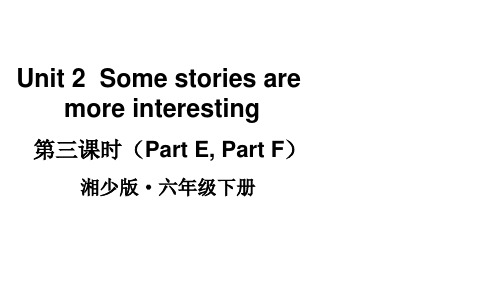
3.Which path is longer, Path A or Path B? _P_a_t_h_B__________________
4.Which path will Dino take to go to the lake? _P_a_t_h_A__o_r_P_a_t_h__B_.________
What kind of books does Peter like? He likes science books.
I like science books.
What kind of books does Anne like? She likes fairy tales.
I like fairy tales.
I like reading science books and fairy tales.
E Let’s Write
Fill in the blanks. 1. What kind of books does Peter like?
Peter likes _s_c_ie_n_c_e__b_o_o_k_s_______________. 2. What books does Anne like?
Anne likes _fa_i_r_y_t_a_le_s___________________.
3. What books does Lingling like? She likes _i_n_te_r_e_s_t_in_g__s_to_r_y_b_o_o_k_s_________.
4. Who likes reading science books and fairy tales? _M__in_g_m__in__g_ likes reading science books and fairy tales.
新版湘少版六年级下册Unit2

Unit 2 Some stories are more interesting.Period 1·Teaching aims:1.Enable the Ss listen, read, say and write the new words:a piece of, meat, cross, eat, happily, its, wood, drop, lose, better2.Be able to use the sentence pattern:“A is /are more …than B”to compare two things.3.Learn to using: I like doing more than doing …·Teaching emphasis:1.Enable the Ss listen, read, say and write the new words:a piece of, meat, cross, eat, happily, its, wood, drop, lose, better2.Be able to use the sentence pattern:“A is /are more …than B”to compare two things.·Teaching difficulties:Understand the story·Teaching tools:Tape, pictures·Teaching methodOral method·Teaching steps:Step 1: Warming up1.Greetings.2.Sing a song :The More We get togetherStep 2: Presentation1.Talk about the students in the classroom. Point to a boyand say: He is tall. Point to another boy and say : He is taller.板书taller A is taller than B2.Review the comparative and superlative of the word.3.T: Look at this picture. Do you know what’s this?S: It’s a story book.T: Yes, I like reading stories. Some stories are more interesting. Write down the title:Unit 6 Some stories are more interesting4.Ss read the title together.5.T: Peter like reading stories, too. This is one of his favoritestories. One day, a man gave a piece of meat to a poor dog .The dog was happy. But after a while, its meat dropped into the river. Do you know why?6.Ss read the story by themselves, and find out the newwords.7.Teach the new wordsStep 3: Practice1.Fast reading and answer the questionsT: Peter likes reading. He sometimes reads stories to hist as quickly as you fiends , Now , let’s enjoy his story , read ican and try to answer the questions :Who gave the dog a piece of meat?What did it see in the river?Whether the dog lost its meat in the end?2.Listen and read the part A.Step 4: Consolidation1.Discuss the answers2.homeworkBlackboard Design:Unit 2 Some stories are more interesting. Notes:Period 2·Teaching aims:1.Enable the Ss listen, read, say and write the new words:a piece of, meat, cross, eat, happily, its, wood, drop, lose, better2.Be able to use the sentence pattern:“A is /are more …than B”to compare two things.3.Learn to using: I like doing more than doing …·Teaching emphasis:1.Enable the Ss listen, read, say and write the new words:a piece of, meat, cross, eat, happily, its, wood, drop, lose, better2.Be able to use the sentence pattern:“A is /are more …than B”to compare two things.·Teaching difficulties:Retell the story·Teaching tools:Tape, pictures·Teaching methodOral method·Teaching steps:Step 1: Warming up1.Greetings.2. Recite the new wordsStep 2: Presentation1.Read the story after video.That piece of meat is better than mineT write down:” A is /are more …than B”(A比B更……)This book is more expensive than that one .My dress is more beautiful than yours.2.T: Do you like reading stories? What else do you like?Which do you like more, …or …?Teach the sentence: I like doing more than…e some word cards to make sentences.4.Free talk.Step 3: Practice1.Act out Part A, retell the story.Key point: meat shop, a piece of meat , took, walked home river , on a piece of wood, crosssaw, another dog , in his mouth, betteropened, wanted, dropped into, lostStep 4: Consolidation1.Assessment.2.copy the new words3.homeworkBlackboard Design:Unit 2 Some stories are more interesting.A is /are more …than BI like … more than …Notes:Period 3·Teaching aims:Teaching aims:1.Enable the Ss listen, read, say and write the new words:a piece of, meat, cross, eat, happily, its, wood, drop, lose, better2.Be able to use the sentence pattern:“A is /are more …than B”to compare two things.3.Learn to using: I like doing more than doing …·Teaching emphasis:1.Enable the Ss listen, read, say and write the new words:a piece of, meat, cross, eat, happily, its, wood, drop, lose, better2.Be able to use the sentence pattern:“A is /are more …than B”to compare two things.·Teaching difficulties:Finish Part D·Teaching tools:Tape, pictures·Teaching methodOral method·Teaching steps:Step 1: Warming up1. Greetings.2. Free talk: What do you like more?Step 2: Presentation1.Listen and read the part A.2.Act it out.3.Read Part D.T: Peter and Ann like reading .They like different kinds ofenjoy the story , read and answer the stories. Now, let’squestions:What kinds of stories do they like?What kind of books does Anne like?What does Miss Li ask the children to do?4.Key point: fairy tales, magic stories. books on science Step 3: Practice1.Check the answer.2.Finish Part EStep 4: Consolidation1.Pair work. Part F and do exercises.2.Try to fill in the blanks.3.homeworkBlackboard Design:Unit 2 Some stories are more interesting.A is /are more …than BI like … more than …Notes:。
湘少版六年级下册Unit2公开课课件

回到首页
A Let's Listen and Say
回到首页
1. happily(副词)高兴地,幸福地 形容词:happy 如:The bird is singing happily. 鸟在快乐地唱歌。
回到首页
2.动词过去式的变化规律: (1)一般直接在词尾加-ed,如call—called。 (2)以不发音的字母e结尾的动词,加-d,如live—lived。 (3)以“辅音字母+y”结尾的动词,变y为i再加-ed,如study—studied。 (4)以重读闭音节结尾,且末尾只有一个辅音字母的动词,双写末尾的
5. another(形容词)另外的,另一个的; (代词)另一个,(另外的)某一个
如:He drank another glass of water. 他又喝了一杯水。
6. lose(动词)失去,丢失 如:They lost the map. 他们把地图弄丢了。
回到首页
Read and complete.阅读课文,完成句子。
1. What kind of books does Peter like? Peter likes ___s_ci_e_n_c_e_b_o_o_k_s__________.
2. What books does Anne like? Anne likes ___f_a_ir_y_t_a_le_s_____________.
3. What books does Lingling like?
She likes ____in_t_e_re_s_t_in_g__st_o_r_y_b_o_o_k_s___.
- 1、下载文档前请自行甄别文档内容的完整性,平台不提供额外的编辑、内容补充、找答案等附加服务。
- 2、"仅部分预览"的文档,不可在线预览部分如存在完整性等问题,可反馈申请退款(可完整预览的文档不适用该条件!)。
- 3、如文档侵犯您的权益,请联系客服反馈,我们会尽快为您处理(人工客服工作时间:9:00-18:30)。
Unit 2 Anne wanted to skate.
Teacher: Chenjin
Teaching Contents
1 .New words and phrases: skating rink/learn/ fall over
2. New sentences : Somebody wants/wanted to …
3. Functions :Talk about what somebody wants/wanted to do something.
Teaching aims:
1. Intellective aims: Know the meaning of the new words and phrases and know to read and spell .Understand the meaning of the new sentences and know to use them to talk about what somebody wants/wanted to do something.
2. Moral educational aims: To arouse the interest of English learning. Encourage them to express the things they want to do.
3. Capability aims: Develop the abilities of English learning and try to communicate in English in the real life.
Teaching importance and difficulties
1. New words and phrases ,new sentences.
2. Talk about what somebody wants/wanted.
Teaching Method:
Task-Based Teaching Method
Teaching Tools:
Pictures/Tape recorder
Teaching Time:
3 periods
Teaching Steps
Period 1
Step 1 Warming up
1.Greetings.
2.Games: Brain Storm
The teacher images to do something, Ss guess what the teacher is doing.
Step 2 Lead in
The weekends are coming .What do you want to do? Do you want to skate? Do you know how to skate?
Step 3 Presentation and drill
SB Page 6 Part B
1.Teach these new words and phrases
skating rink/ learn /fall over
2.Work in pairs to practice.
3.Games :Magic eyes.
Step 4 Fast reading
SB Page 5 Part A
1.Lead in.
2.Listen to the tape carefully , answer the questions below:
1)What did Anne wanted to do?
2)Who taught her?
3.Check the answers.
Step 5 Consolidation
Homework
1.Copy new words.
2.Listening and reading .
Period 2
Step 1 Warming up
1.Greetings.
2.Dictation
Step 2 Intensive reading
SB Page 5 Part A
1.Listening and reading.
2.Explain if possible.
3.Finish Part C
Write the correct forms of verbs in the brackets.
4.Check the answers.
Step 3 Presentation and drill
Teach these sentences:
A: What do you want to do ?
B:I want to…
Step 4 Practice
Pair work.
1.Make a list of things you want to do this weekend. Ask and answer questions about each other’s plan for the weekend.
2.Write down what you friend tell you.
3.Ask a few Ss to have a short report.
Step 5 Extension
Make a short story with “want”
Homework
1.Retell the story in Part A.
2.Act out the story you made.
Period 3
Step 1 Warming up
1.Greetings.
2.Check homework.
Step 2 Practice
Work in pairs to talk about what you want to do.
Step 3 Writing.
SB Page 7 Part E
1.Make sure to understand these words
mend /read /clean/ fly /wash /play
2.Ask Ss to look at the pictures , write down what each person
in the picture want to do. They can use the words given to write the answers.
3.Check the answers.
Step 4 Listening practice
SB Page 8 Part F
1.Lead in .We are going to listen to a fairy tale—Cinderella .
2.Listen to the tape carefully .Write 1 to 8 in the picture below
to arrange them in order.
3.Check the answers.
Step 5 Extension
Listen to the tape again and again, read after tape several times ,try to retell the story.
Homework
1.Revise Unit
2.
2.Preview Unit
3.。
